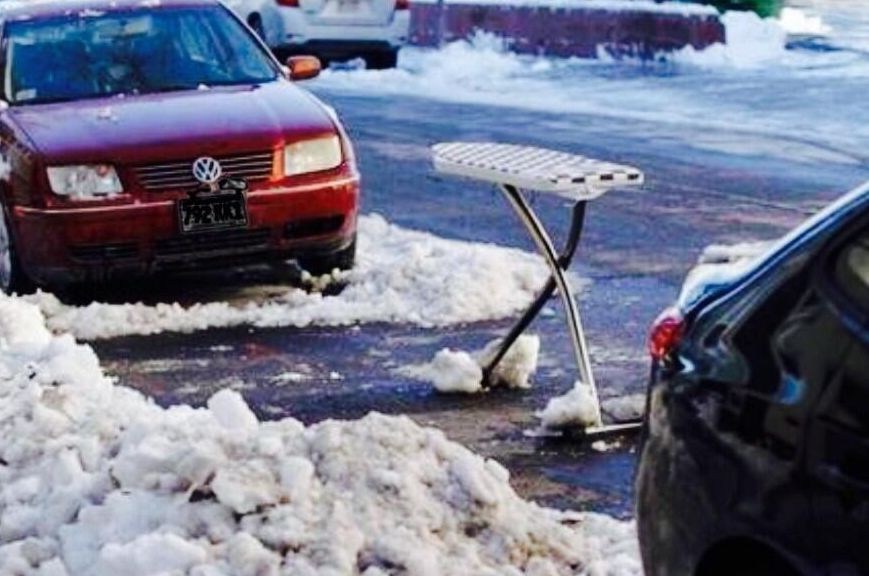“Saving” A Shoveled-Out Parking Spot: Your Hard-Earned Right Or A Jerk Move?

This is not an uncommon sight in Philadelphia during the winter. (Twitter: @NoSavesies)
There are two issues surrounding this traditional spot-saving ritual: First, is it legal? Second, regardless of legality, do you have some sort of tacit right to that spot?
“Just because a practice has been going on for so long that [it] has been ignored, doesn’t mean that we need to continue to do so,” explains Philadelphia police sergeant Eric Gripp, who also created the @NoSavesies Twitter account and hashtag, to the Philadelphia Daily News.
Gripp says that there aren’t laws on the books in Philly that specifically forbid the practice of saving a spot with a lawnchair or whatever other piece of furniture you’re wiling to risk losing by putting it in the vacated spot. However, there are laws against littering and obstructing the roadway.
That said, cops — not just in Philly, but in other cities where this is a common practice — tend to not issue citations to spot-savers, presumably because it’s hard to locate the owner of some random, busted folding chair left sitting in the gutter.
Instead, says Gripp, he and his fellow officers are more frequently called to handle the fights that erupt over saved spots, or from people like visiting nurse services who can’t find a parking spot because entire blocks are littered with bits of furniture.
Since I haven’t had a car in more than 15 years and my street in Philly is so narrow you can’t actually park on it, this issue doesn’t impact me. And so I took the question to my colleagues who own cars and/or have lived in snowy cities.
Ms. Kate Cox is now working in Consumerist’s D.C. office, but she’d previously lived in Boston where she says spot-saving has “always been considered a total [expletive redacted] move,” but “everyone does it anyway.”
Mary Beth Quirk sees her fair share of snow in Brooklyn, but not as much as she did growing up in Wisconsin. She feels that spot-saving might be accept under two conditions:
“If you (A) did the shoveling, and (B) are sitting in the chair, the spot is yours,” MBQ explains. “But the traffic cone thing? That’s bad. I’ll just drive over it.”
Meanwhile, Meg Marco, who has come across spot-saving during her time in both Chicago and NYC, worries about those who might unwittingly find themselves in a saved-spot dispute because of some other jerk’s actions:
“Say the first guy shovels his car out in the morning and leaves a cruddy chair there, hoping his spot will still be free when he returns. Then an hour later, a second guy comes, scoffs at the chair and tosses it out of the way. So after that guy leaves and a third driver pulls up to find an empty, shoveled-out, unclaimed spot, she might be the one getting yelled at when the first driver returns home to find her car in the spot he shoveled out that morning.”
And D.C.’s Ashlee Keiser, formerly of Iowa, apparently adopts the same double standard held by most spot-savers: “If the spot was being saved for me: acceptable. If it was being saved for someone else: illegal,” she jokes (I hope). “Honestly, if there’s not a person there guarding the spot, then I’d consider it fair game.”
Albany’s own Laura Northrup sums it up by saying, “In an ideal world, it would be illegal to save the spot for any longer than it takes to go get your car from wherever it is. In a real world where law enforcement has to make real rules, if no one is actually standing in the spot then it should be fair game.”
This is a very complicated matter… You know, a lot of ins, a lot of outs, a lot of what-have-you’s. Which is why we’re putting it to y’all to make the call:
Want more consumer news? Visit our parent organization, Consumer Reports, for the latest on scams, recalls, and other consumer issues.

